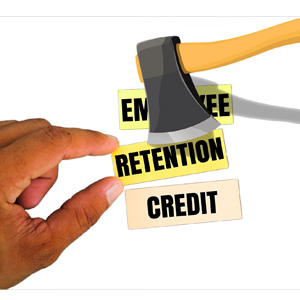ERC Crackdown

A surge of fraudulent claims for the Employee Retention Tax Credit (ERC or ERTC) has put the IRS on alert. The program has been temporarily suspended; applications will be scrutinized closely and possibly audited; and there will be delays in processing and funding the applications.
The Employee Retention Tax Credit (ERC or ERTC) is a refundable tax credit that was part of the U.S. government’s response to the COVID-19 pandemic, aimed at encouraging employers to keep employees on their payroll in the face of sudden and drastic reduction in revenue in 2020 and 2021.
If you have been one of those small business owners who have applied or are considering applying for ERC, then you want to be quite sure that you are able to back up your claim of reduced revenues with a solid trail of paperwork including quarterly filings (Form 941), payroll details, and more.
Why such a caution about something that ought to be the case anyway—honest filings, backed by best practices of bookkeeping and tax filing? That is because of a spate of incidents of ERTC mills—illegitimate third-party tax or financial service providers— enticing businesses to claim the ERC, even if they are not qualified for it.
It is because of such a surge in fraudulent claims that the IRS, on September 14, 2023, suspended the ERC until at least December 31, 2023. The IRS Commissioner, Danny Werfel, expressed concern about the aggressive unscrupulous promotion of these credits, warning businesses to be cautious and follow specific pandemic-era guidelines. The IRS is actively investigating false claims and has urged honest taxpayers to avoid such schemes as many ERTC mills have exploited this program aimed at aiding small businesses who faced legitimate losses and were struggling to retain employees.
To file or not to file for ERC?
If you decide to file a claim, it is crucial to base it on a substantial revenue decline in 2020 and 2021 compared to 2019. If you’re considering a second opinion on pending or settled ERC claims, consult a tax professional. Remember: if an audit reveals ineligibility or an overstated claim, you may need to repay the ERC with interest and potential penalties.
Just the same, businesses that have suffered a legitimate loss of revenue need not be discouraged from filing for this tax credit as it can significantly help offset your pandemic-related revenue losses. Businesses using professional ERC firms for eligibility analysis and computation based on revenue drop should not worry about an audit.
Tips for filing for ERC
Keep the following in mind if you intend to file for an ERC claim:
- Carefully review IRS Notice 2020-20 and prioritize thorough documentation when dealing with the IRS.
- If your ERC application is based on revenue decline, document quarterly decreases of 50% in 2020 and 20% in 2021 compared to the same quarters in 2019.
- You can engage a CPA or tax professional and submit a claim for 2020 until April 15, 2024; and for 2021 until April 15, 2025.
- Use revenue figures that align with your financial records and general ledger. Additionally, keep records of your Paycheck Protection Program (PPP) funding, quarterly payroll returns (Form 941 and 941 x), and employee W2 records.
Waiting for your refund?
For those waiting for an ERC refund, the IRS will continue processing claims, but at a slower pace. Processing times during the suspension will be at least 180 days, possibly longer due to audits or additional information requests.
Already received your refund?
For businesses that have already received ERC credits or amended their payroll returns for 2020 and 2021, it’s crucial to inform your CPA or tax professional to file amended tax returns following IRS guidelines.
Documents required for backing up an ERC application

- PPP1 & PPP2 loan forgiveness application and loan approval letters.
- Weekly/Biweekly payroll details by pay date, employee name, and gross amounts of Q2, Q3, Q4 of 2020 and Q1, Q2, Q3 of 2021.
- 941 for Q2, Q3, Q4 of 2020 and Q1, Q2 of 2021.
- If the owners/family members are on payroll, the IRS may need the names of the family members.
- Details of majority ownership in any other similar businesses.
Guest columnist Raj Shah is the founder and president of UVS VAT and Property Tax America LLC., companies that help businesses with VAT recovery, property tax appeals, ERC claims, and more. Business Insights is hosted by the Law Firm of KPPB Law (www.kppblaw.com). Sonjui L. Kumar is a founding partner of KPPB Law, practicing in the area of corporate law and governance. Disclaimer: This article is for general information purposes only and does not constitute legal, tax, or other professional advice.
Enjoyed reading Khabar magazine? Subscribe to Khabar and get a full digital copy of this Indian-American community magazine.
blog comments powered by Disqus










